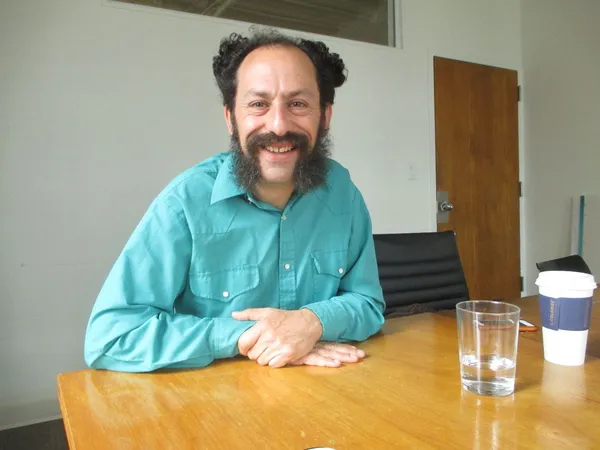Following the world première at the Tribeca Film Festival of The Public Image Is Rotten, shot by Yamit Shimonovitz, director Tabbert Fiiller went with me into the John Lydon style that took us to Comme des Garçons, Julian Schnabel and pajamas, Muriel Spark's The Public Image, John Waters at a PiL concert, and wildlife. Beastie Boys' Adam Horovitz, Red Hot Chili Peppers' Flea, Sonic Youth's Thurston Moore, and Moby count PiL as an influence.
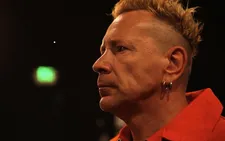 |
| John Lydon: "John is so good with words. I was just trying to keep up. We shot every day." |
John Lydon's Public Image Ltd. started out as Keith Levene, Jah Wobble, and Jim Walker, and has moved on to include Martin Atkins (Brian Brain), Karl Burns (The Fall), John McGeoch (Siouxsie and the Banshees, Magazine), Ginger Baker, to the current line up of Lu Edmonds (The Damned, The Mekons), Bruce Smith (The Pop Group, The Slits), and Scott Firth.
Tabbert Fiiller's portrait of John Lydon, the former Johnny Rotten, mixes archival footage with brand new interviews showing him in his kitchen and living room in Los Angeles, and elsewhere. He opens up about the breakup of the Sex Pistols, trouble with managers, the Ritz Show debacle in New York, childhood, religious education, his meningitis and the resulting memory loss, and the ups and downs of Public Image Ltd.. Band members old and new, as well as a number of colleagues talk candidly about the man and his music.
The director in our conversation filled in some of what didn't end up in the documentary about style, fabric, Lydon's nature adventures, shyness and guilt.
Anne-Katrin Titze: Let's begin with the locations. You had access to the homes of a lot of the people you interviewed? Were some of them filmed elsewhere?
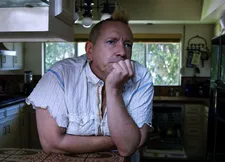 |
| John Lydon in the kitchen of his Los Angeles home: "The five days were different but he didn't dress up for that. He is wearing pajamas in one of them." |
Tabbert Fiiller: I wanted to shoot in their homes or their workplace whenever possible, because I think that you gain some insight into people by seeing where they are. Whenever it's hotel rooms, it's because they were traveling or they didn't want to take us to their home.
AKT: John Lydon's interviews were all at his home, in his kitchen for example?
TF: There's a couple in hotels when they were touring.
AKT: You show beer bottles, packets of cigarettes - which mostly come in couples. One for you and one for him?
TF: Sometimes yes.
AKT: When Lydon is talking about his childhood, the meningitis, and the coma he was in for six months, you captured a startling sentence. He says "When you don't remember your parents, you feel so …" and then there's a long pause. Audiences think now - what will he say? And then he says "… guilty." Nobody expects him to say guilty. Do you remember that moment?
TF: Yeah. There's a lot of things in John's life you can trace back to the effects of the meningitis. For the guilt - I don't remember if it's in the film but he also talked about the guilt for the meningitis and also the Catholic guilt. I think John's relationship with his father was with a lot of misunderstandings. Like a lot of fathers, he wasn't very verbal. John thought that his dad blamed him for getting sick - as a child.
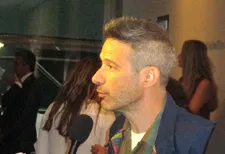 |
| Beastie Boys' Adam Horovitz, along with Moby, Red Hot Chili Peppers' Flea, Sonic Youth's Thurston Moore count PiL as an influence. Photo: Anne-Katrin Titze |
AKT: In order to have some kind of control. If you think it's your fault, you can control it and you don't feel so terribly helpless. So his guilt countered the helplessness. As far as the Catholic church is concerned, in your film he calls the priests "scary monsters". He describes how he avoided them and says: "I learned how to appear ugly and useless - funny how I used all of that later!" How did you feel when you got these nuggets for your film?
TF: Yeah, I mean, there are so many. John is so good with words. I was just trying to keep up. We shot every day. Those interviews were like five hours and we were shooting the whole time. It was for five days. We'd get there in the morning and kind of like ease into it. The cameras were not on tripods, they were on monopods.
AKT: Did he forget about the cameras ever?
TF: He didn't forget about the cameras. He's very aware of the cameras and turns to look at them sometimes. But he felt comfortable with my wife [Yamit Shimonovitz], who was the cinematographer, and our camera operator. It's all nice people there, so he felt good.
AKT: There is a moment when Moby talks about Annalisa and the fact that the song is about a 14-year-old girl in Germany who was killed because of an exorcism. In the context of the coma and what you said before, do you feel there is a sort of exorcism he himself went through? To get rid of the guilt? I am asking because there seems to be none of that later on. Coma, priests and then he was full-force exorcising that in his art.
_225.webp) |
| "He went to see PiL in Baltimore and came backstage to meet John. Because the films of John Waters, they mean a lot to John …" Photo: Anne-Katrin Titze |
TF: I never thought about that in relation to Annalisa. There's also, like, he was very shy as a child and then, certainly after or during the Sex Pistols, he became an extrovert, right? I think that was a conscious effort for him. I think it's like a conscious effort to better himself. Even though he sang about that there's no future, it didn't mean that he was okay with having no future, you know?
AKT: In the film, it comes across that he is the stable one. He is the core and everybody else is leaving and betraying. He is the central force who does not want that and who actually wants people to get along and to work and stay together.
TF: Yes. I think he has learned through time to set the environment so that people can stay.
AKT: Did you talk with him some more about the wildlife things he was involved with? The chimpanzee show he did? This is something many people don't really expect from him.
TF: He also did a show about sharks and about bugs.
AKT: Chimpanzees, sharks, bugs - is he doing anything wildlife now?
TF: He likes the ocean a lot. He lives in LA. The house that's in the movie is pretty close to the ocean.
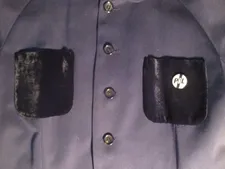 |
| 99 PiL badge on Rei Kawakubo Comme des Garçons jacket Photo: Ed Bahlman |
AKT: Speaking of animals, you are interviewing someone and a dog paw enters the frame. It's very funny.
TF: That's Keith Bourton, he was the manager during '87 to like '89. We shot in his house and his dog was there. She - the dog is a female- she probably always lays on the couch, so she was on the couch for the interview as well.
AKT: That's what makes it feel alive. Many documentaries about famous people cut everything away that could be conceived as an imperfection - although that is actually what makes it alive, like the dog's legs.
TF: Going into it, most important for me was the archival material. I couldn't force verité scenes to happen. What could bring something else is to have a wider shot and see the environment.
AKT: It tells about the character. I think Bob Tulipan has the books on the bookshelf behind him color coordinated. is that his home?
TF: No, that was somebody else's house. One of the producers' house.
AKT: Who has books color coordinated? The yellow and the orange section? Let's talk about the John Lydon style. Did you talk about how he dresses? How he picks his outfits in the morning?
TF: We didn't talk about that. But he talked about clothing and fabric. It's not in the documentary. He has a lot of interests and we had to narrow it down.
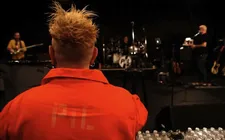 |
| John Lydon with Public Image Ltd.: "I think he has learned through time to set the environment so that people can stay." |
AKT: What did he say about fabric?
TF: During his childhood section he talked about a teacher who always used to wear Prince of Wales check, or something?
AKT: That's what it's called, yes.
TF: I didn't know what it was, so I looked it up and realised that's a type of fabric. And then when he was in jail in Ireland, he talked about the uniform they gave him and he said it was elephant cord. You know what it is?
AKT: I do, very thick corduroy, used for upholstery also.
TF: He thought it was appalling. He said he didn't want them to release him out of jail wearing that.
AKT: Did he mention the colour?
TF: I think it was grey.
AKT: In your film we see him wearing an argyle yellow and green sweater vest that could be Comme des Garçons. It looks great. You got five days and five different outfits?
TF: I didn't shoot those interviews with the argyle or the blue shirt. The five days were different but he didn't dress up for that. He is wearing pajamas in one of them.
 |
| 2017 Tribeca Film Festival at the BMCC Tribeca Performing Arts Center Photo: Anne-Katrin Titze |
AKT: Like Julian Schnabel who is almost always in pajamas. I saw during the end credits a thank you and a little clip of John Waters. I rushed here to meet with you from the Tribeca screening of Blurred Lines: Inside the Art World. There was Waters, again in a little clip. What is their connection?
TF: He went to see PiL in Baltimore and came backstage to meet John. It's a small thing but I felt it would be nice at the end. Because the films of John Waters, they mean a lot to John and it's nice to see that the music of PiL also means a lot to John Waters.
AKT: What was your first introduction to John or the Sex Pistols? Do you remember the first moment you thought, wow, I like this?
TF: I remember seeing images of the Sex Pistols before listening to the music. I remember very clearly a moment listening to PiL when I was 14. I grew up in Mexico City and we went on a trip to Guadalajara to skateboard over there. We were like eight friends. One of them had a bootleg PiL cassette and we listened to that a lot on that trip. And it was very nice because that friend that had that cassette came to Tribeca for the premiere.
AKT: Had John seen the film before then?
TF: He hadn't seen it before so I was very nervous because of that. I think he was nervous too. So he was on extra overdrive. He did say "You lied! You said you're going to make me look good!"
AKT: He does look good. He is a style icon. I really liked the section about The Flowers of Romance.
TF: John recorded a lot of the instruments himself. A lot of people don't know about that.
AKT: Muriel Spark's novel gave Lydon the name Public Image. Have you read it?
TF: No, I haven't read the novel.
AKT: Did John?
TF: He did. It's about an actress dealing with her fame. At the time, you know, he was in the Sex Pistols and super famous, so it spoke to him.
AKT: He never mentions Malcolm McLaren's name?
TF: Oh, he doesn't?
AKT: Not once, I think. He calls him "the manager". I thought it was really interesting. Is it sort of a taboo name?
TF: He mentions Malcolm. When Bob Tulipan started working with him, he mentions "I never liked managers, ever since Malcolm." So there's one small one [mention by name]. He does talk about him and about a lot of friends disappointing him. In an archival TV interview, they ask him if it's a general lyric or if it's about specific friends. He says, it's in general but it could apply to several of my old managers.











